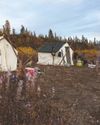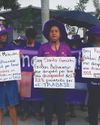Denemek ALTIN - Özgür
Mutual AID For The End Of The World
Briarpatch
|September/October 2019
Conversations with disabled, trans, and racialized survivalists who are changing what it means to be a disaster prepper

A us Bahadur doesn’t look anything like the doomsday preppers you’d see on reality TV. When I walk into their workshop, they’re holding a mobility cane and wearing a T-shirt that reads “Low Femme Weirdo.” In their early 30s, the Toronto resident invokes a casual, sardonic humour as we discuss potential scenarios that could end or seriously alter our lives in a future marked by climate change – from floods to fire to scarcity of food and potable water.
Aus started teaching the GOAT (Get Out Alive, Together!) workshop series in Toronto in 2016, in response to the overwhelming number of people teaching survival and disaster-preparedness skills from a right-wing, individualist perspective. GOAT is rooted in principles of mutual aid and collaboration, with a focus on marginalized identities – centring the people who mainstream disaster narratives often paint out of the picture, portray as a threat, or assume would succumb to the Darwinian logic of “survival of the fittest.”
“I identify as ‘multiply marginalized,’ which is a simple way to say a very complicated thing,” Aus explains to me. “I’m PoC [a person of colour], I’m mixed-Black, I’m from a low-income family. I have mobility issues and chronic pain, as well as obsessive-compulsive and anxiety disorders.” By virtue of these things, they explain, even the decision to leave the house involves risks ranging from physically inaccessible infrastructure to harassment from police.
Bu hikaye Briarpatch dergisinin September/October 2019 baskısından alınmıştır.
Binlerce özenle seçilmiş premium hikayeye ve 9.000'den fazla dergi ve gazeteye erişmek için Magzter GOLD'a abone olun.
Zaten abone misiniz? Oturum aç
Briarpatch'den DAHA FAZLA HİKAYE

Briarpatch
PLATFORMS FOR PEOPLE, NOT PROFIT
Digital platforms boast that they’ve “democratized” cultural production. But what would truly democratic platforms look like in Canada?
10 mins
January/February 2020

Briarpatch
ORGANIZING THROUGH LOSS IN THE HEART OF OIL COUNTRY
The story of climate justice organizing in Alberta, at the heart of the tarsands, is the story of a group of young activists learning what it means to lose, and keep on fighting
13 mins
January/February 2020

Briarpatch
GROWING THE LABOUR MOVEMENT
How unions are using community gardens to engage members, nourish communities, and help strikers weather the picket line
11 mins
January/February 2020

Briarpatch
A NEW ERA FOR OLD CROW
In the Yukon’s northernmost community, the Vuntut Gwitchin First Nation is reckoning with how to preserve their land and culture, amid a warming climate and an influx of tourists
16 mins
January/February 2020

Briarpatch
“At Least Hookers Get Wages”
The risky business of sex work in the gig economy
14 mins
November/December 2019

Briarpatch
The Literal – And Literary – Futures We Build
Briarpatch editor Saima Desai talks to two judges of our Writing in the Margins contest about Idle No More and MMIWG, ethical kinship, writing queer sex, and their forthcoming work.
9 mins
November/December 2019

Briarpatch
The Cost Of A T-Shirt
In Honduras, women maquila workers are fighting back against the multinational garment companies that they say are endangering their health and safety.
18 mins
November/December 2019

Briarpatch
Milking Prison Labour
Canada’s prison farms are being reopened. But when prisoners will be paid pennies a day, and the fruits of their labour will likely be exported for profit, there’s little to celebrate.
12 mins
November/December 2019

Briarpatch
Bringing Back The Beat
In mainstream media, labour journalism has been replaced by financial reporting and business sections. But journalism students are raising the labour beat from the grave.
10 mins
November/December 2019

Briarpatch
There's No Journalism On A Dead Planet
Corporate media owners are killing local newspapers – which is making it impossible for everyday people to understand the on-the-ground impacts of the climate crisis
18 mins
September/October 2019
Translate
Change font size
